The movie opens with Duke Lambert (Guy Standing) and his family and guests driving home after a fun night at the local carnival, but the evening almost takes a nasty turn as a dark shadow seems to be stalking them. The two cars carrying our cast of characters survive this scary encounter, though one of the cars does take out a flower cart, and they arrive safely at Villa Felicitá the stately home of Duke Lambert. While everyone unwinds after their narrow escape with death we learn that the Duke’s son Corrado (Kent Taylor) is hopelessly in love with Grazia (Evelyn Venable), the daughter of Princess Maria (Kathleen Howard), but Grazia herself is reluctant to marry despite everyone thinking this is a perfect match, almost badgeringly so as they tell her, "Oh we think you have been free long enough."
Cause you know, freedom is so overrated.
She tries to explain to the group that though she loves them all that she isn’t quite ready to settle down, “Because life is too…there is a kind of happiness I want to find first, if I can. There is something out there that I must find first. Something I must understand.” Grazia asks to be left alone for bit and goes to sit in the garden, but alone she isn’t and soon the group hear her scream and find her collapsed in the garden. When asked what happened she is unable to explain herself clearly, “There was something cold and terrible. I was sitting by the fountain watching the water. I could hear the music, and then a shadow blew over. That’s what it was, a shadow.” Some think she was startled by a prowler, though no evidence of one can be found when the grounds are searched, but later that night Duke Lambert is approached by the “intruder” and is shocked to learn that he is speaking to Death itself, “I am…how shall I describe it? A sort of vagabond of space. I am the point of contact between eternity and time.”After he is done here he has to visit Ebenezer Scrooge.
Turns out that Death (Fredric March) wishes to discover why men fear him as they do and plans to spend three days as a mortal to find out. He himself has no way to grasp even the concept of fear, “What could terror mean to me who having nothing to fear?” Seems Death has grown weary of always being misunderstood, “Can you conceive how lonely I am when there is nothing that doesn’t shun me, that doesn’t fade as I come near?” Death wishes to know why men cling to life while fearing him, and to do this he strikes a bargain with Duke Lambert; he will put Death up for the weekend with the added stipulation that none of the household can know of his true nature, “I shall be a mortal, and I must be treated as a mortal in every particular. No one shall show repulsion or fear, on pain of my instant displeasure.” He clearly states that if this happens he will return in his proper form and the results will not be pleasant for anyone. Death decides to take on the mortal form of Prince Sirki, a guest who was expected but who Death informs the Duke that he will not be seen again, “Not in this life.”Death in the meat suit of Prince Sirki of Vitalba Alexandri.
The Duke tries to prepare his family and friends for the arrival of the Duke by warning them that this guest is no ordinary person and to ignore any of the Prince’s eccentric or strange behaviors, “And above all, you mustn’t be afraid. And no matter what happens you must not shun him, or protest or run…or run.” It’s clear that the Duke is terrified of what Death could do if displeased but that kind of an introduction would seem to cause more angst and suspicion and thus result in the exact opposite of what he’d intended, but lucky for him this group consists of the idle rich and so they’d let almost anything slide as long as the perpetrator was stinking rich, doubly so if he is also of royal blood. This is especially the case with La Contessa di Parma (Katharine Alexander) and American Rhoda Fenton (Gail Patrick), who are hungry for rich husbands and who spend much of the three days in a competition on who can win the Prince’s heart. They unfortunately (or pretty lucky in the long run) don’t stand a chance because Death is clearly smitten with Grazia, but her and her mother were not staying for the weekend so Death must suffer the gold digging efforts of the Contessa and Rhoda.I’d hate to have Death find me boring.
Throughout the three days, while the two women vie for the Prince’s heart, we learn that a man survived jumping from the Eiffel Tower, that a schoolhouse blaze suffered no casualties, and the guns of two warring factions fail to work. So apparently while Death is in a mortal form he is unable to fulfill his duties, which would really set the world into utter turmoil, but what is odd here is that being dead and being hurt are two different things yet this film treats them as about the same thing; leaping off the Eiffel Tower would result in a person’s body being smashed to bits and the schoolhouse fire should have turned the children into crispy critters whether or not they die of those injuries. In those cases death would be considered a release from pain and suffering, but I guess this movie would be a little too dark if it addressed children in agony without the ability to die. So instead while Death is on holiday everyone in the world is suddenly invulnerable. I understand the choice here but I think if handled a little differently it could have gone towards showing how Death isn’t a villain but an important part of life.Instead we learn that Death can’t lose at the gaming tables.
After almost breaking the bank of the local casino he states that he doesn’t understand men spending time in smoky rooms gambling when they could be outside in the fresh air, “It seems to me that men have not discovered the magnificence of this life.” When Baron Cesarea (Henry Travers) asks pointedly to what exactly is the Prince looking for he is informed that, “I came here for a game to play…a game worth playing” and that in the two days he’s been with Duke Lambert and company everything he has seen seems so very futile and empty. The Baron explains that there are only three games, “Money, love and war” but that it really all comes down to the one game, “One never grows tired of love.” The Prince states that he finds this game to be, “The strangest, the saddest, the emptiest of all.”“One pair of lips will change your mind one day.”
What follows is The Prince trying to explore this game but when he spends too much time analyzing his emotions while experimenting with Rhoda she is put off by his calculated thinking and storms off, but later when the Contessa makes a play for him he informs her that this is impossible, “Because you will take one step toward me and know my secret, and lose courage.” The Contessa pleads with him to “Try me” and when he does she sees the shadows inside him as he wills her to see who he really is. Things do not go well. She screams “I want to live!” and calls for Eric. When a worried group arrive the Duke has to do some fast talking to prevent his son from calling out the Prince, but later the Prince admits to the Duke that he has been “Caught in this web of flesh” and that he cannot think of returning as he is, “To die alone, without living or being loved, and that I will not have!” The theme of gods or immortal beings envying us puny mortals is nothing new but it is really handled beautifully her by Frederic March, you feel the pain and agony of being given a taste of something but then being told to abandon it for all eternity. Lucky for him he once again encounters Grazia, and despite Eric’s efforts, the two fall deeper in love.There is almost a Romeo and Juliet vibe to this as it looks like they are doomed lovers, “I will hear your footsteps wherever you are,” the Prince tells her, “When our two worlds hold us apart.” With his last hour of humanity quickly slipping by he is sorely tempted to take her when she asks him to, but instead he pleads to her, “Let me hold you once and feel your life. You are the meaning of beauty I must know. Oh Grazia let me hold you, let me feel that last ecstasy and know that I had lived.”
Who knew Death was such a romantic?
When the two go off together for a bit it’s not clear exactly what happens between the two of them, as the Hays Code wouldn’t allow audiences to see hanky-panky between unmarried people (even if one of them is technically not quite a person), but I’m betting it was pretty steamy. Things finally come to ahead when the Duke is forced to reveal to the group the Prince’s true identity, which really angers Death who had wish to part with the group as friends, with kindly remembrances, “But now my shadow has come between us.” He reveals to the group that not only has he found love but the pain of losing it, “If I must lose it.” Grazia’s mother pleas for the life of her daughter and he eventually relents but when Grazia joins them she insists that she wants to go with him. He tells her that she can’t go with him, that she doesn’t know who he is, and then the clock strikes midnight and he becomes Death, in all his dark glory, and once again he bids them farewell, “Goodbye my friends. Remember that there is only a moment of shadow between your life and mine. And when I call, come bravely through that shadow and you will only find me your familiar friend.”Scary but not so grim of a reaper.
Now this is where you’d think the movie would end, Death having sacrificed his own happiness so that the woman he loved could stay and live with her friends and family, but when he says goodbye to Grazia and tells her, “Now you see me as I am" and then her response shocks them all, “But I’ve always seen you like that. You haven’t changed." I've seen this movie four times now and this moment still causes me to tear up.Death: “You have seen me like this?”
Grazia: “Yes, always.”
Death: “Then there is a love which casts out fear, and I have found it! And love is greater than illusion and as strong as death."
If that isn't one of the most romantic endings in movie history I'll eat my hat. Sure it's dark and has echoes of Persephone’s deal with Hades to live with him in the underworld, minus the kidnapping, but Grazua is clearly a woman who saw deep inside the soul of another and fell in love. That in this particular case that person in question turned out to be the incarnation of Death is only a minor quibble. This is truly a beautiful film and March’s portrayal of Death is simply wonderful as is Evelyn Venable’s performance here as the lovely Grazia, and though this movie has been remade a couple of times, rather terribly in the case of Meet Joe Black, it’s this original telling that will warm your heart and bring a tear to your eye. I highly recommend Death Takes a Holiday to even the most stoic of hearts.
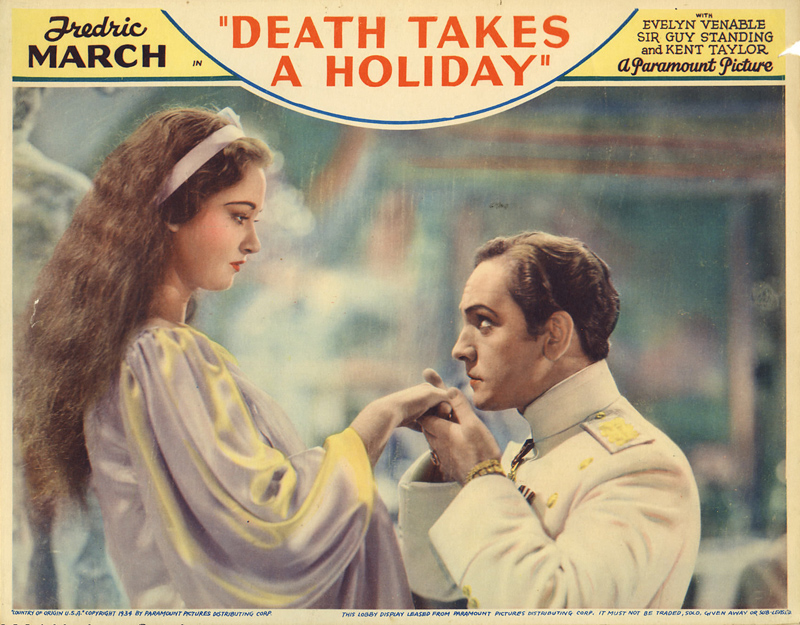
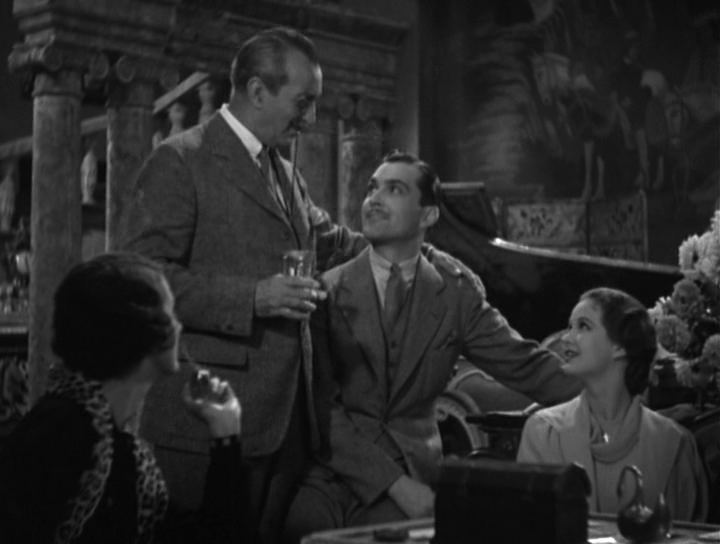
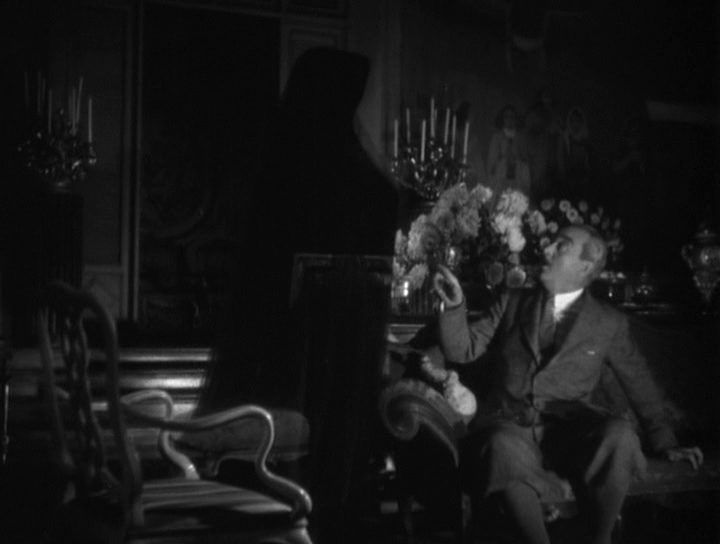
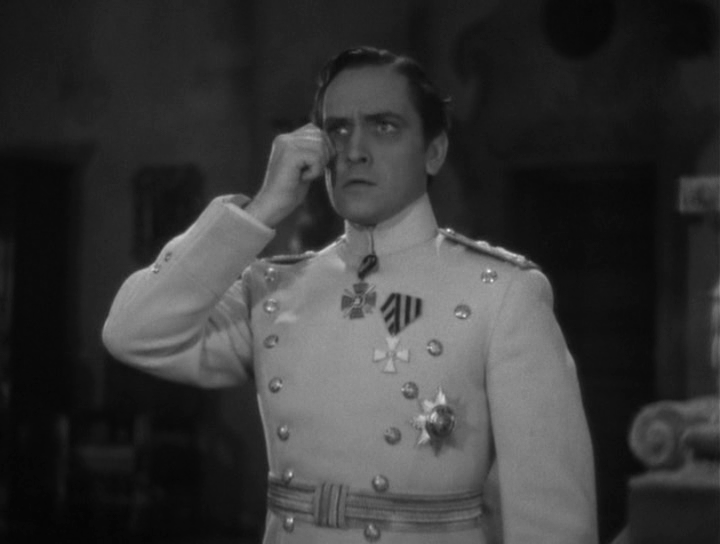
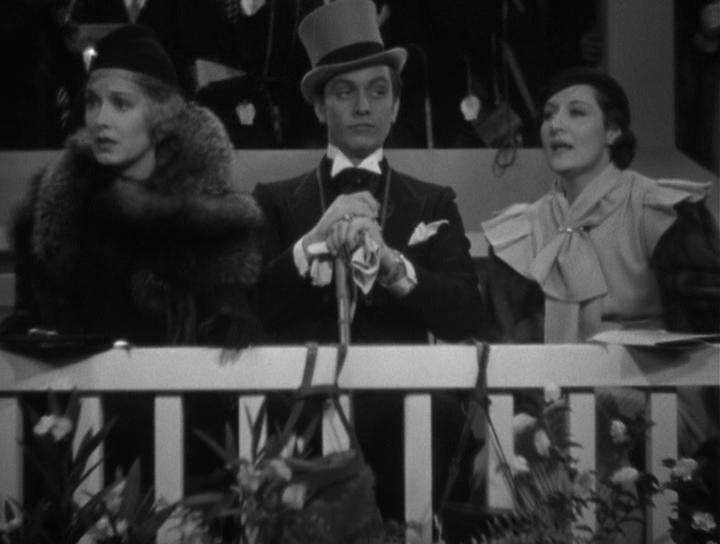


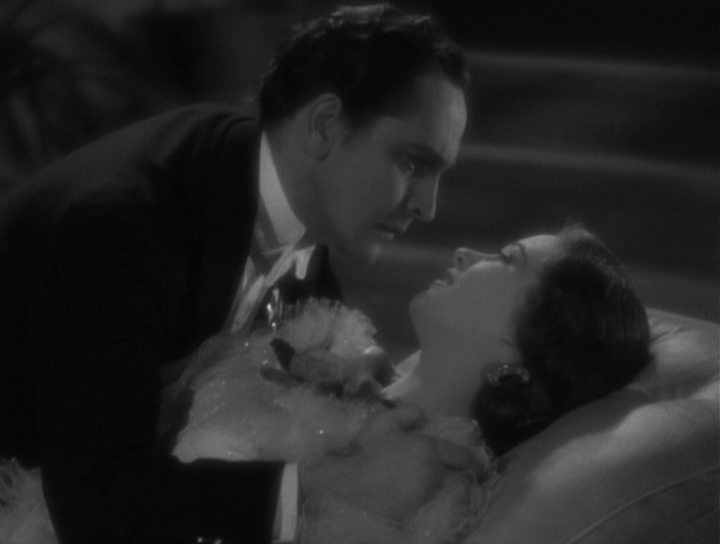


No comments:
Post a Comment